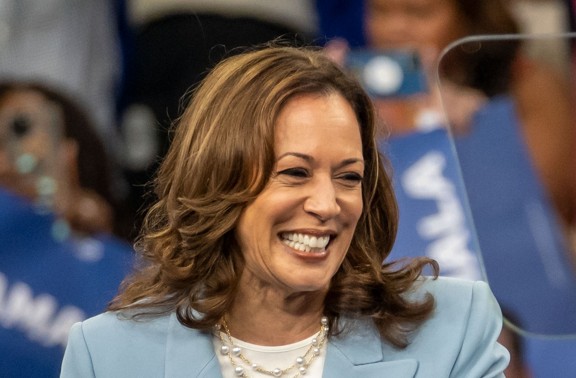WHY DID KAMALA LOSE?

KAMALA HARRIS IS A MOST LOVELY PERSON. UNFORTUNATELY, TO LEAD THE USA, HAVING A LOVELY LAUGH DOES NOT CARRY THE DAY.
BY THE LEGAL EAGLE
Kamala Harris’s loss in the 2024 presidential election can be attributed to a combination of factors, ranging from political dynamics to campaign strategies and broader societal issues. Kamala Harris’s campaign cost $1.2 billion and she’s in debt for $20 million. President Donald Trump has offered to pay off her debt. He was not being sarcastic when he made the offer. He was speaking sincerely. Here are some key reasons that contributed to Harris’s defeat:
Association with an Unpopular Administration:
One of the primary reasons for Harris’s loss was her close association with President Joe Biden’s administration. Throughout her campaign, Harris struggled to distance herself from Biden’s policies and decisions, many of which were unpopular with the electorate. Biden’s approval ratings had been low, hovering around 40% for much of his term. This association made it difficult for Harris to present herself as a candidate of change, which many voters were seeking.
Threatening American Citizens:
In an attempt to attract voters by showing strength, Harris made it a point to tell an audience that she was shocked by her incredible power. She said that with the stroke of her pen, she could ruin anyone’s life. This performance was one of the cruelest and most foolish of her campaign.
Economic Concerns:
Economic issues played a significant role in the election. Voters were concerned about rising costs, inflation, and housing affordability. Harris’s campaign failed to effectively address these concerns or present a clear plan to improve the economic situation. This inability to connect with voters on economic issues was a critical weakness.
Campaign Strategy and Messaging:
Harris’s campaign strategy and messaging were also problematic. She often struggled to articulate how her presidency would differ from Biden’s, which left voters unclear about her vision for the future. Additionally, her campaign’s decision to highlight Donald Trump’s controversial statements at rallies did not resonate with voters as intended. Instead of focusing on her own policies and plans, the campaign’s negative focus on Trump completely backfired.
Demographic Shifts:
Harris underperformed among key demographic groups compared to previous Democratic candidates. While she had strong support among women of color, she lost ground with other demographic groups, including Black and Latino voters. This shift in voter support was crucial in battleground states, where every vote counts.

Broader Societal Issues:
Societal issues such as sexism, racism, and xenophobia also played a role in Harris’s defeat. Despite progress in these areas, biases and prejudices still influence voter behavior. Harris faced significant challenges as a woman of color running for the highest office in the country.
Republican Momentum:
The Republican Party, led by Donald Trump, capitalized on the dissatisfaction with the current administration. Trump’s campaign effectively mobilized his base and expanded his support in key states. The Republicans also gained control of the U.S. Senate, which further demonstrated the party’s momentum and voter support.
Word Salad:
Kamala Harris’s speech style has been a topic of discussion, with some people describing it as “word salad.” This term generally refers to a confused or disorganized mixture of words and phrases that can be difficult to follow. It’s not a recognized style of public speaking, but rather a term often used to describe speech that seems incoherent or disconnected. In Harris’s case, she chose a few words from the closing lines of noted literature mostly likely for the purpose of being seen as a world leader.
Unfortunately, she quoted from questionable literature that most people were unfamiliar with. This sentence for instance, “We have the ability to see what can be, unburdened by what has been, and then to make the possible actually happen”. Those words were written by Karl Marx for the Communist Manifesto.
Kamala Harris’s loss in the 2024 presidential election was the result of a complex interplay of factors. Her close association with an unpopular administration, economic concerns, ineffective campaign strategy, demographic shifts, societal issues, and strong Republican momentum all contributed to her defeat. Understanding these factors provides insight into the challenges faced by candidates and the evolving dynamics of American politics.
Harris’s campaign costs will be revealed later this week. In the meanwhile, President Trump says that we should all get together and help pay off Harris’s bills.






 Afrikaans
Afrikaans Albanian
Albanian Amharic
Amharic Arabic
Arabic Armenian
Armenian Azerbaijani
Azerbaijani Basque
Basque Belarusian
Belarusian Bengali
Bengali Bosnian
Bosnian Bulgarian
Bulgarian Catalan
Catalan Cebuano
Cebuano Chinese (Simplified)
Chinese (Simplified) Chinese (Traditional)
Chinese (Traditional) Corsican
Corsican Croatian
Croatian Czech
Czech Danish
Danish Dutch
Dutch Esperanto
Esperanto Estonian
Estonian Filipino
Filipino Finnish
Finnish French
French Frisian
Frisian Galician
Galician Georgian
Georgian German
German Greek
Greek Gujarati
Gujarati Haitian Creole
Haitian Creole Hausa
Hausa Hawaiian
Hawaiian Hebrew
Hebrew Hindi
Hindi Hmong
Hmong Hungarian
Hungarian Icelandic
Icelandic Indonesian
Indonesian Irish
Irish Italian
Italian Japanese
Japanese Javanese
Javanese Kannada
Kannada Kazakh
Kazakh Khmer
Khmer Korean
Korean Kyrgyz
Kyrgyz Lao
Lao Latin
Latin Latvian
Latvian Lithuanian
Lithuanian Luxembourgish
Luxembourgish Macedonian
Macedonian Malagasy
Malagasy Malay
Malay Malayalam
Malayalam Maltese
Maltese Maori
Maori Marathi
Marathi Mongolian
Mongolian Myanmar (Burmese)
Myanmar (Burmese) Nepali
Nepali Norwegian
Norwegian Pashto
Pashto Persian
Persian Polish
Polish Portuguese
Portuguese Punjabi
Punjabi Romanian
Romanian Russian
Russian Samoan
Samoan Scottish Gaelic
Scottish Gaelic Serbian
Serbian Sesotho
Sesotho Shona
Shona Sindhi
Sindhi Sinhala
Sinhala Slovak
Slovak Slovenian
Slovenian Somali
Somali Spanish
Spanish Sundanese
Sundanese Swahili
Swahili Swedish
Swedish Tajik
Tajik Tamil
Tamil Telugu
Telugu Thai
Thai Turkish
Turkish Ukrainian
Ukrainian Urdu
Urdu Uzbek
Uzbek Vietnamese
Vietnamese Welsh
Welsh Yiddish
Yiddish Yoruba
Yoruba Zulu
Zulu